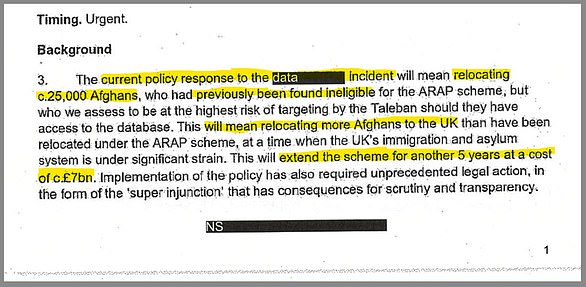It began with a simple yet devastating fat-finger blunder by a British soldier who pressed ‘send’ on an email containing access to a confidential database.
At a stroke, 100,000 Afghans were put ‘at risk of death’. But British government officials were also exposed as their details were in the database too.
Amid great secrecy and alarm within the Government, Operation Rubific was launched. It was one of the biggest peacetime evacuations in modern UK history: rescuing Afghans whose names were on a database that contained some 33,000 records of people the Taliban warlords now running Afghanistan might wish to kill or torture for their ‘treachery’ in supporting Britain during the UK’s 20 years of operations there.
The projected cost of the evacuation was £7billion, yet British taxpayers were neither informed nor asked if they wanted to spend such a vast sum.
This is the untold story of Operation Rubific and how panic convulsed Whitehall in the summer of 2023.
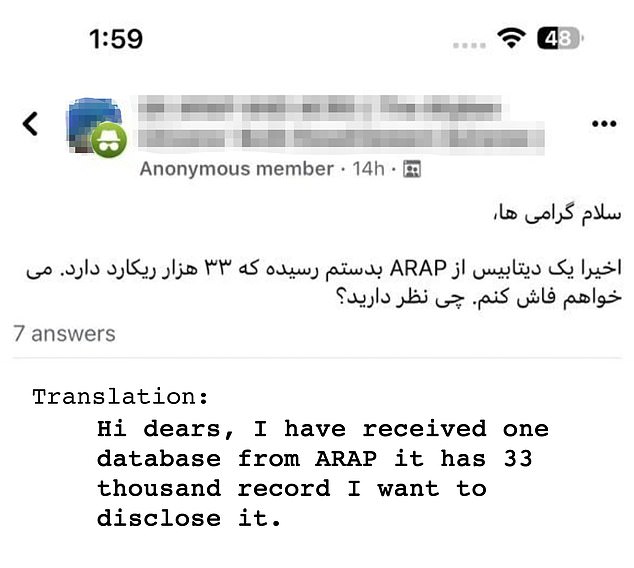
This is the Facebook post which sparked the whole crisis. An Afghan going by the username ‘Anonymous Member’ said he had the British database and threatened to ‘disclose it’
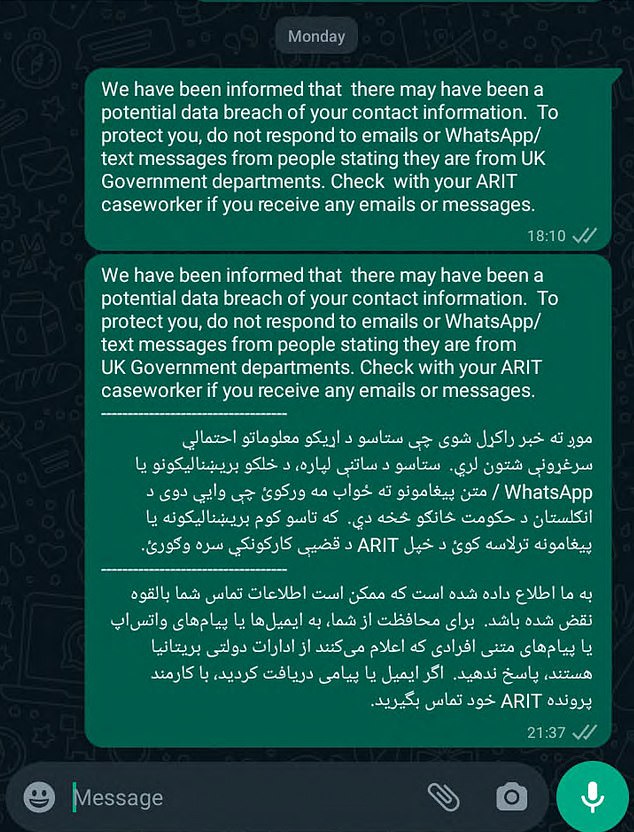
The message from panicking British officials which ‘struck the fear of god’ into Afghans hiding from Taliban revenge squads
The alarm was first raised on August 14, 2023, when an Afghan man bragged on a Facebook forum that he had obtained a confidential British database of Afghans who had been seeking sanctuary in the UK.
UK officials were alerted and immediately sent warnings to 1,800 Afghans that their contact details may have been compromised.
At 10.57am the next morning Armed Forces Minister James Heappey received an email warning that the ‘bone-chilling’ situation means the Taliban could have a ‘kill list’ of 33,000 people who helped Britain during the war and were now seeking residence here.
At 8.09pm, a ‘crisis alert’ came into the Ministry of Defence building in Whitehall after chiefs had gone home. Top brass were informed that someone had obtained access to secret MoD computer files.
The initial assessment of the leak by military intelligence was that it could be ‘malicious’, the Daily Mail has been told – which sent a shiver down the collective spines of those in charge of national security.
It sparked fears that a dangerous spy – possibly a Russian, Iranian or Taliban agent – could be roaming the UK’s supposedly bulletproof security system.
A covert ‘spycatcher’ operation quickly swung into action, involving MI6, Scotland Yard, GCHQ and outside assistance from the CIA and American’s Homeland Security agency.
Then-Prime Minister Rishi Sunak chaired a meeting of Cobra, the government’s emergency committee, as the intelligence services hunted for a mole they know only by the pseudonym ‘Anonymous Member’. They asked themselves: Who has taken the document and, more alarmingly, what else might they have stolen from British military computers? Could terrorists now have access to MoD systems?
The possible consequences, in an age of repeated terror attacks on the streets of Britain, were horrifying.
One source told the Mail at the time: ‘It’s with MI6 – and all kinds of s*** is going on.’
The awful reality was clear: factoring in wives and children of those on the list, the leak meant some 100,000 people had been ‘put at risk of death’ – the Government’s own words – by the British blunder.
So why did such a list exist in the first place – given what an asset it could represent to Britain’s enemies?
For an answer we have to go back to the days following the fall of Kabul to the Taliban in 2021 when there was an urgent scramble to help Afghans who had been loyal to Britain.
Thousands of military interpreters and other brave souls who had stood shoulder to shoulder with British forces and officials faced being hunted down as ‘infidel’ traitors by the Taliban.
The Daily Mail had long played its part in helping these Afghans after dozens of frontline interpreters complained to us in Kabul, 12 years ago, that they were being ‘abandoned’ to Taliban reprisals.
In 2015, we launched our award-winning Betrayal of the Brave campaign highlighting their plight, which led to the government introducing a relocation scheme known as ARAP, leading to thousands of deserving cases being given new lives in Britain as a reward for their support. The database was started to track the details of Afghans who merited sanctuary here.

Victorious Taliban fighters patrolling the streets of Kabul, using vehicles, weapons and often uniform seized from the Afghan National Army and police
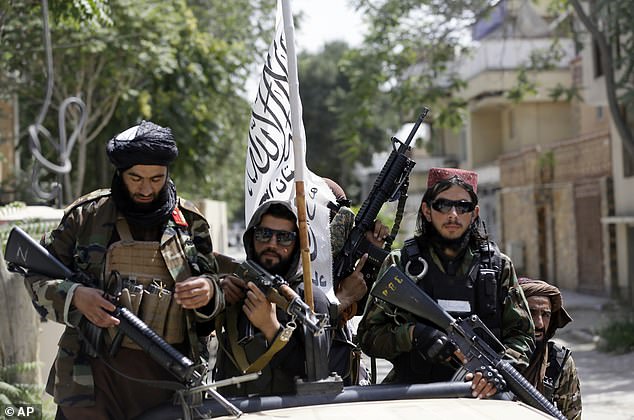
A blunder by the British government put ‘100,000 people at risk of death’ at the hands of Taliban revenge squads – triggering Operation Rubific to rescue the most vulnerable

Afghan interpreter Shaffy with David Cameron during the Prime Minister’s 2011 trip to Afghanistan. Hundreds of loyal interpreters face being hunted down as traitors by the Taliban
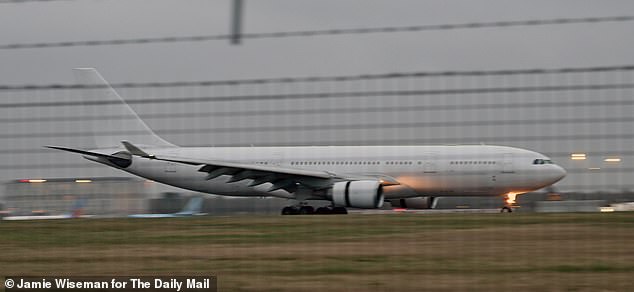
Shaffy was brought to the UK on this plane, which the Mail watched landing at Stansted in February 2024 – but tens of thousands of others are being left behind to their fate
And yet the bureaucratic process has been painstakingly slow, meaning some of those waiting for British help have been murdered, beaten and tortured while their families, including children, have also become targets of the Taliban.
The revenge of the warlords only encouraged more applicants to seek safety in Britain, and their details were added to the list as they joined the assessment process.
Some on the confidential list had already been approved for relocation to Britain, but were unable to escape. Some were still waiting for a decision. Meanwhile there were others on the list who had applied but had been rejected.
Yet regardless of their status, the very fact they had applied for sanctuary in Britain made them a prime target for the Taliban, and the UK had a moral duty to keep their details private.
Now the British authorities had lost control of the database revealing names, phone numbers, email addresses and in some cases identities of family members.
The Mail can reveal these included several Afghans who had been previously rejected as violent thugs, having been thrown out of their national army for violent or sexual assaults, raising the question of whether details such as these contributed to the Government’s decision to obtain a superinjunction to suppress the story.
But all applicants who had been rejected – and some perhaps never stood any chance of being accepted by the UK – had a target painted on their back, courtesy of His Majesty’s Government (HMG).
All of which is why the Government began working on its clandestine plan to help them: Operation Rubific. The ongoing costs to UK taxpayers – at one stage ministers signed up to estimates of £7billion – were not subjected to any Parliamentary or public debate.
Farcically, it was found that the leak had happened in February 2022 – a full 18 months before it was discovered. A catastrophic error had been made by a solider working in London under the then-director of special forces, Sir Gwyn Jenkins.
Sir Gwyn was later asked at one of the emergency Cobra meetings by a minister if either he or Admiral Tony Radakin, the Chief of the Defence Staff, would be resigning over the matter. He reportedly replied: ‘Certainly not.’
It is understood the soldier under his command had been tasked with vetting Afghans for eligibility to one of the UK’s resettlement schemes such as ARAP. The soldier apparently blundered by sending an email enabling access to the full list to a contact in Afghanistan – who then passed on the database to others. Tragically, the British soldier thought it showed only 100 names, but the spreadsheet apparently had ‘hidden rows’ revealing many more.
One of the Afghans who received it had had his own application for sanctuary rejected. Deeply disgruntled by this, in August 2023 he threatened to expose the full list.
He posted information on a private Facebook chatroom set up as a support group for 1,300 Afghans to discuss their cases with each other.
This was the Afghan who became known as ‘Anonymous Member’ – his username – and whose boast that he had a copy of the full list from an MoD computer sent waves of panic from Afghanistan to Whitehall.
Challenged to prove his claims about the list by another member of the forum, he sent that member a private message, saying: ‘It has 33,000 records – I want to disclose it’.
The ‘Anonymous Member’ then posted the details of 10 people, including those of the other member – who was horrified by the disclosure and immediately raised the alarm.
Word reached British diplomats in neighbouring Pakistan where a team coordinates the relocations and keeps in touch with the group. Within hours, some 1,800 Afghans were being sent an urgent message from British officials in the Pakistani capital Islamabad.
Recipients were warned ‘there may have been a potential data breach of your contact information’. Worrying about possible Taliban tricks to trap the recipients, the British officials instructed them that ‘to protect you, do not respond to emails or WhatsApp/text messages from people stating they are from UK Government departments’.
The alert messages ‘struck the fear of God’ into the Afghans who received them, one of the recipients told the Mail.
It seemed to take hours, even days, before the MOD fully grasped the magnitude of the disaster. Armed Forces Minster James Heappey was sent the email informing him of the catastrophe the next morning by a civilian campaigner for Afghans who had to come to learn of the leak. The campaigner added it was ‘beyond horrifying’ that the UK could be ‘directly responsible for the massacre of thousands of people’.
After the MoD top brass learnt of it that evening, officials worked through the night to assess the damage. Shortly after sunrise the next morning, August 16, a ‘Gold Group’ of senior officials was established to manage the incident, overseen by Heappey.
There followed some three meetings of Cobra, the government’s emergency committee, and Rubific was tasked with working out how to reach the vulnerable Afghans on the list before Taliban hit squads got to them first.
The grim spectre of hundreds if not thousands of Afghans loyal to the UK – and who had heroically saved countless lives of British servicemen – being rounded up and executed haunted Whitehall.
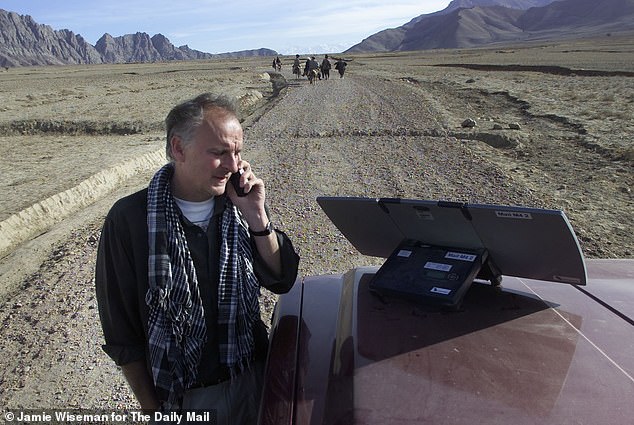
Veteran Mail reporter David Williams has made more than 30 trips to Afghanistan over two decades and was the first journalist in the world to uncover the data leak fiasco
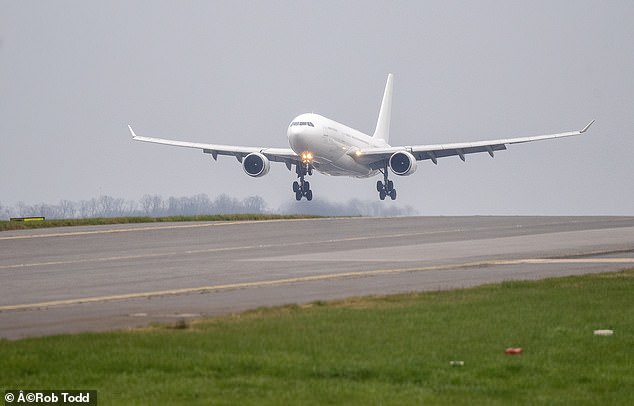
An unmarked Airbus 330-202 from Islamabad touches down at Stansted

The UK government told the High Court its data blunder had put Afghans at ‘risk of death, torture, intimidation or harassment’ from the Taliban
Ministers were warned in a briefing paper: ‘Should it be clear [to the public] that HMG, due to its own error, has put individuals’ lives at risk and not taken any remedial action, this would likely result in widespread condemnation’.
MoD officials triggered what they called a ‘full cross-government response’, with defence chiefs sheepishly admitting to other government departments that there had been what they euphemistically termed a ‘specific erroneous release’ of confidential information.
Intelligence agents and military specialists were among those drafted into secretive rescue missions. These became a race against time to help those whose identities had been betrayed and bring those deemed most at risk to the UK – without them knowing why. The vast majority of the rest would be left behind.
In the headquarters of MI6, the Foreign Office, the MOD and the British High Commission in Islamabad, daring plans were formulated to sneak thousands of people out of Afghanistan. The Mail knows operational details of these extraordinary missions, but is not publishing them because it could endanger those still involved in the ongoing perilous work.
However, in broad terms, a British task force has been orchestrating the rescue of men and their families and guiding them into neighbouring Pakistan.
From Pakistan, they are flown on to the UK, often within a fortnight, on specially chartered flights. Approximately 100 people a week on average are being airlifted into Britain, with more than 18,000 evacuated since autumn 2023.
Almost nothing has been published about this astonishing operation, which has seen the Afghans mainly housed on remote military bases in England, away from the eyes of the public.
Also on the leaked list were members of the so-called Triples, elite Afghan units trained and funded by the UK, but who were fighting for the Afghan army rather than directly for Britain.
Meanwhile the hunt to identify the ‘Anonymous Member’ intensified. Scotland Yard, the Defence Intelligence agency – which monitors threats to homeland security and to UK interests overseas – and GCHQ, the government’s cyber security service, were all recruited to find ‘the rat’ – as one ex-translator put it to the Mail – who had threatened to leak the file.
Agents toiled around the clock to identify him and then work through all his contacts with other people. In Pakistan, where he was believed to have been based, ‘doors were kicked down’ by specialist security units, operating at the request of the British government.
They sought to quickly identify and speak to all of the ‘Anonymous Member’s’ friends and associates to establish whether he had passed on the sensitive list to anyone else. Spies sought to delete any trace of the list from servers overseas. The Daily Mail has been told that, crucially, British security officials believe the Taliban never got hold of the list. But there is no way the leak was successfully shut down, because we were shown a copy many months later.
Yesterday, MOD sources tried to downplay the operation. But the Mail has seen a Cabinet Office briefing note dated as recently as February 3, this year, which states: ‘The current policy response to the data incident will mean relocating 25,000 Afghans who had previously been found ineligible…this will extend the scheme for another five years at a cost of c.£7bn.’

Former Daily Mail Chief Reporter David Williams pictured reporting from Afghanistan in 2001/2002 with The Mail’s photographer Jamie Wiseman
In the coming months, the data breach will almost certainly land the MoD with yet another massive fine from the Data Commissioner. In 2021, lax security saw it leak the personal data of ‘just’ 245 people – it was hauled over the coals by the Information Commissioner and slapped with a £1million penalty for that ‘serious infringement’, reduced to £350,000 because the MoD is a public body. Now the Information Commissioner is investigating once again.
Knowing that the leak was about to be made public, the MoD has over recent days set the ball rolling for an operation, years in the planning, to notify the individuals who are on the list that they could be a target.
‘Break glass’ was the term given to this moment. A call centre and government web pages have been set up to greet the inevitable influx of enquiries from terrified Afghans.
There is one person who will not be needing it – the Afghan who started this crisis in the first place by wrongly receiving the database and then threatening to reveal it.
The Mail can reveal he is now living in Britain, having been relocated here with at least seven members of his family.



